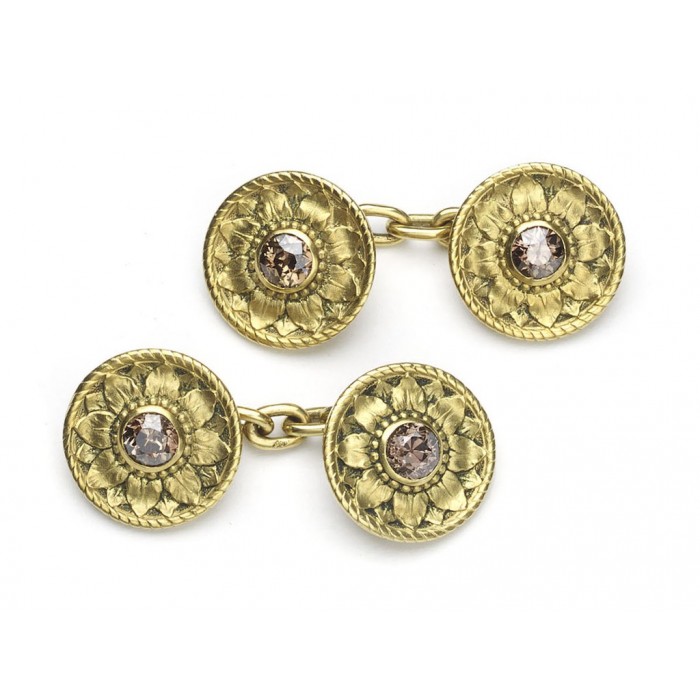
Antique Gold Frog Cufflinks
A pair of antique gold frog cufflinks, with models of frogs on oval back plates, with a wire twist within the surround, mounted in gold with a...








A pair of French, Art Nouveau, champagne brown diamond and yellow gold floral cufflinks, for Maison G. Desbazeille, with old-cut pink toned dark champagne brown diamonds, in rub over settings, in the centre of engraved sunflower like flowers, with a twisted wire border, on chain links, mounted in gold, with French eagle head marks for 18ct gold and maker's mark G*D for Germain Desbazeille, circa 1895.
Louis Desbazeille became partners with Ernest Derouen, circa 1872. In 1877 Louis Desbazeille started his own business. He specialised in carved gems, cameos, intaglios and engraved garnets and gentlemens jewellery, such as cufflinks, lockets, swivel seals, rings and stickpins. His son, Germain, joined the firm, in 1881. Louis Desbazeille retired in 1886. La Maison G. Desbazeille, broadened the range, to include plique-à-jour jewellery with Arabic, Persian and Japanese themes, hair combs, bookmarks and hatpins. Germain used pierced cameos (à jour) in an attempt to boost their popularity. By 1889 cameos and intaglios had become less fashionable. Germain Desbazeille concentrated on marketing medal jewellery accented with applied patinas and enamels. Medal jewels, imitating ancient Greek and Roman medals and coins, was a branch of the Art Nouveau jewellery movement. Master medal engravers and those adept at the use of the tour à réduire were in high demand and received important commissions from the top jewellers. Desbazeille commissioned some of the most excellent examples, including the 'Cleopatra', 'The Four Seasons', 'Women with Flowers' and 'Saint George' medals by Émile-Séraphin Vernier (1852-1927). From 1895 the firm also kept Oscar Roty (1846-1911) occupied with the creation of religious and irreligious medals. Roty was an expert in the use of the tour à réduire - a machine, inspired by a lathe, designed in Russia, in the 1700s, to reduce designs and etch metals. He studied at the Ecole de Beau Arts, Paris. In 1885 he was awarded the Chevalier of the Légion d'Honneur. He won the Grand Prix for his medal jewellery in 1889. Germain Desbazeille, whose maker's mark is a G, a star and a D in a lozenge, had premises at 6 rue Monsigny, Paris.
Data sheet
A pair of antique gold frog cufflinks, with models of frogs on oval back plates, with a wire twist within the surround, mounted in gold with a...
A pair of Wiese, intaglio cufflinks, set with cornelian intaglios, mounted in 18ct gold. The intaglios depict a child's head; the bust of a...
A pair of Tiffany art nouveau sapphire and ruby cufflinks, with three cabochon sapphires set on one side and three cabochon rubies on the other,...
A pair of antique, Fabergé, diamond and enamel cufflinks, with alternating diagonals of pale lilac guilloché enamel and rose-cut diamonds, mounted...
A pair of Art Nouveau gold cufflinks, with a carved design of a lady, with a flower garland, in her flowing hair, against a background of birds on...
Here you can add custom original content(text, images, videos and more) for each product page.